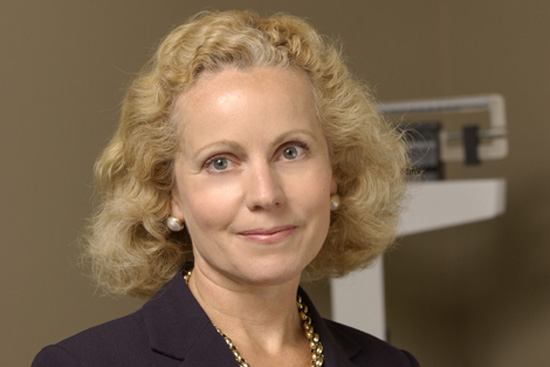Groundbreaking Binge-Eating Study Undertaken by Psychology Professor
 |
| Ruth Striegel-Moore, professor and chair of psychology, is leading a binge-eating study. |
| Posted 12/02/05 |
| The largest, most comprehensive binge-eating study ever undertaken has been initiated in Portland, Oregon, and the primary investigator is Ruth Striegel-Moore, professor and chair of psychology.
Striegel-Moore, an internationally-recognized expert on eating disorders, says the study will last four years and include male and female subjects between 18 and 50 years of age. People participating in the study who present with eating disorders will be offered treatment options. The study is being funded by National Institute of Mental Health, the National Institute of Diabetes, Digestive and Kidney Disease, and Kaiser Permanente Center for Health Research of Portland, Oregon. Kaiser-Permanentes involvement is the reason that the study will be conducted in Portland, Striegel-Moore says. Thats where they are headquartered and they will provide access to the study population and offer the clinical sites. Kaiser-Permanentes inclusion is also part of the reason that this study will offer opportunities for ground-breaking inquiry. The HMO maintains an extensive database of all its members health care visits, conditions and treatments, as well as significant demographic information on each patient. It has extensive procedures in place that ensure patients information is protected and that individuals participation in the study is completely voluntarily. As a result, Striegel-Moore and her co-investigators will be able to look beyond the immediate data generally associated the eating disorder studies. For example, in these studies we usually know the subjects age, sex and maybe a little bit more, she says. But this database will allow us to look at such things as health history, income level, education, past treatments sought and a wealth of other information that will allow us to get much more specific in our analysis. Its a treasure trove of comprehensive data that is, quite frankly, a researchers dream. The studys initial phase, a screening of nearly 7,000 men and women, is just finishing up. The screening phase targeted respondents randomly, rather than inviting participation only of individuals who self-identified as having a problem with their eating behavior. This component is unique and permits a more accurate estimate of the extent of binge eating in the community than when research relies on individuals to judge whether they have an eating problem. However, not everyone suffering from binge-eating is aware of the problem. “Not seeking help can lead to needless suffering and create additional health problems that include obesity, heart conditions, infertility and hypertension,” Striegel-Moore says. She adds that, when studies selectively recruit individuals with eating problems and fail to actively recruit individuals who do not experience eating problems, the number of individuals who suffer from an eating disorder that are identified will be inflated. Striegel-Moore says that this is the first major study to include male subjects and such a broad age range. As a result, the study will provide new data on how common binge- eating is in men and individuals who are beyond college-age. We know that men and people who are not in their teens and twenties suffer from binge eating too, she says. But for some reason theyve been excluded from major studies. From the initial pool of respondents, 250 people will be identified for the second stage of the study and invited to participate in treatment. Each participants progress will be followed for a year. Researchers will analyze the effectiveness of the treatment options on several levels. “One of the innovative components of this study is that we will examine in detail what treatments people receive as part of usual clinical care, Striegel-Moore says. “Prior studies have investigated how successful an experimental treatment was. What is unknown is how eating disorders are being treated in clinical practices outside of clinical research studies. Our study will also examine the cost of our treatment compared to the cost of the typical treatment patients receive in the context of usual clinical care. This will help inform decisions about optimal use of scarce health care resources. |
| By David Pesci, director of Media Relations |

